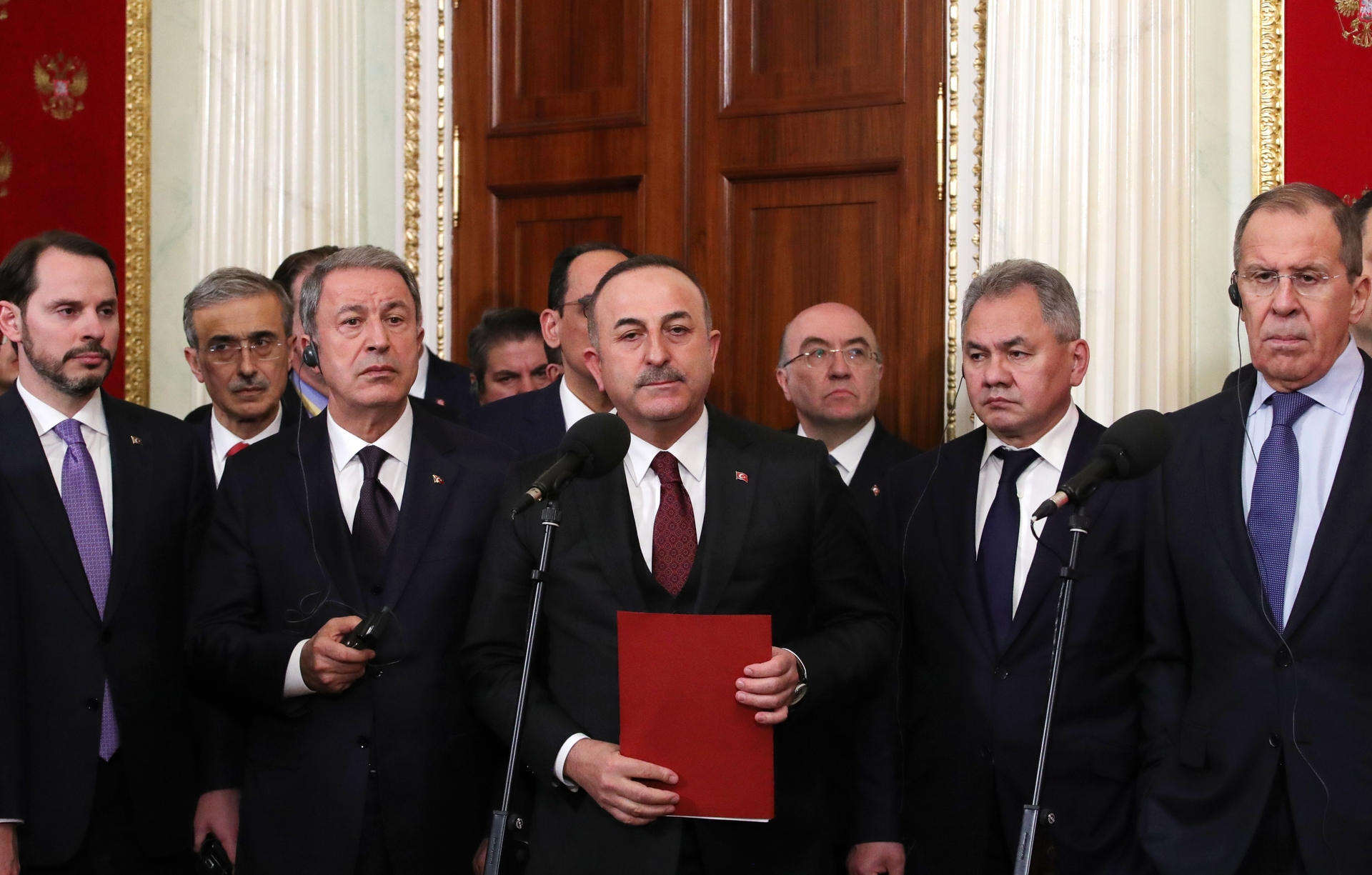Russia and Turkey agreed on a joint document to resolve the situation in the Syrian province of Idlib. Negotiations between Vladimir Putin and Turkish leader Recep Tayyip Erdogan on this subject were held in Moscow.
The leaders talked face to face for three hours, after which the delegations of the parties joined them. In total, the negotiations took more than six hours. As the Kremlin noted, the presidents thoroughly examined "the problems and possible ways to resolve the Syrian crisis, taking into account the aggravation of the situation in the Idlib de-escalation zone."
“We do not always agree with our Turkish partners in our assessments of what is happening in Syria, but each time at critical moments, relying on the achieved high level of bilateral relations, we have so far been able to find common ground on the disputed issues that have arisen and come to acceptable solutions. This happened this time as well, ”Putin said, summing up the negotiations.
The parties confirmed their interest in continuing to work together within the Astana format.
“Following the results of our negotiations, we agreed on a joint document, the provisions of which will be announced by the foreign ministers. It outlines the decisions that we, together with the President of the Republic of Turkey, Mr. Erdogan, developed during today's more than six-hour consultations, ”Putin said.
He expressed the hope that these agreements would serve as a good basis for ending the hostilities in the Idlib de-escalation zone, stopping the suffering of the civilian population and the spread of the humanitarian crisis.
The agreement signed by the parties included several key points. In particular, from midnight on March 6, the cessation of all hostilities along the existing contact line is announced, Russia and Turkey also create a security corridor six kilometers wide north and south of the M-4 highway in Syria. In addition, Russian and Turkish forces begin joint patrols along the Turkish M-4 highway.
- The Foreign Ministers of Turkey and Russia read out the document adopted at the end of the negotiations.
- RIA News
- © Mikhail Klimentyev
Commenting on the outcome of the negotiations, Yuri Pocht, professor at the Department of Comparative Political Science of RUDN University, drew attention to the fact that despite the belligerent statements of the Turkish military, it turned out that Ankara was able to conduct a dialogue.
“I think this is a successful meeting. Good agreements were reached. It is felt that the negotiations were incredibly tense ... In any case, both sides expressed a desire to de-escalate the situation and prevent a direct clash of our armed forces, ”the expert said in an interview with RT.
Aggravation in Idlib
The Syrian province of Idlib remains the last large area of the republic, which is controlled by militants. In 2017, following the results of negotiations in Astana, it was decided to create a de-escalation zone in this territory. Later, in 2018, Russia and Turkey agreed to create a demilitarized zone in Idlib.
At the same time, the activity of the militants in the provinces remained. In April 2019, the General Staff of the Russian Federation cited data according to which 99% of the de-escalation zone in Idlib is controlled by terrorists from the Jabhat al-Nusra group *.
At the end of 2019, a new aggravation began in the region, in response to which the Syrian army launched the Idlib offensive. In the first months of 2020, the republic’s authorities managed to return a significant part of the de-escalation zone to their control. At the same time, the Turkish leadership promised "not to leave Idlib to the" Assad regime "and announced a new military operation in the province.
In the course of the events that followed, the Turkish military fell under the blows of the Syrian army and the Russian air forces, conducting operations against militants in Idlib. In late February, Ankara announced the death of more than 30 of its troops as a result of an air strike in Syrian Idlib.
In response, the Russian Defense Ministry reported that the Turkish military were in the battle formations of terrorists, which were the purpose of the strike. The Russian defense department stressed that Ankara did not provide data on the movement of its military, as a result of which they unexpectedly came under attack.
Turkey later launched its own military operation, while stating that it was not looking for a confrontation with Russia. Moreover, on February 29, Erdogan announced that he had asked Vladimir Putin not to interfere in the confrontation between the Turkish forces and the SAR army.
Commenting on Erdogan’s words, Moscow indicated that only the Russian military are in Syria legally and at the request of the Syrian authorities.
In addition, the leadership of the SAR from March 1 closed the airspace over Idlib because of the deteriorating situation in the province. According to Damascus, objects that violated airspace will be considered hostile and will stray.
According to Vladimir Shapovalov, deputy director of the Institute of History and Politics of the Moscow State Pedagogical University, the dialogue between Russia and Turkey has been developing constructively lately. He pointed out that the conflict in Idlib had a significant impact on Russian-Turkish relations, but the situation did not lead to irreversible consequences.
“What is happening now, once again testifies to the fact that Russia can and can conduct dialogue and finds arguments in favor of a compromise position that suits both sides of the dialogue,” Shapovalov said.
He added that the agreement concluded by the parties creates the conditions and basis for further resolution of the situation.
* “Hayat Tahrir al-Sham” (“Jabhat Fath al-Sham”, “Front al-Nusra”, “Jabhat al-Nusra”) - the organization was recognized as terrorist by the decision of the Supreme Court of the Russian Federation dated December 29, 2014.

